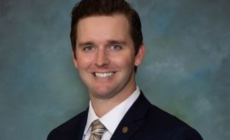-
Red Sox Reportedly Eyeing Trade For Pair Of Diamondbacks Pitchers - 8 mins ago
-
Virginia City Councilman Is Set on Fire in Attack, Police Say - 18 mins ago
-
Feds arrest ex-NBA star Gilbert Arenas for ‘high-stakes illegal poker’ - 36 mins ago
-
Braves’ Chris Sale Could Be Out for Season After Unfortunate Update - 44 mins ago
-
Park Avenue Killer Bought Rifle for $1,400 From His Casino Boss - about 1 hour ago
-
Jhoan Duran Trade Sweepstakes Gaining Steam As Deadline Nears - about 1 hour ago
-
Canada’s Measles Cases Surpass U.S., Alberta Officials Push for State of Emergency - 2 hours ago
-
Danville, Virginia City Councilman Set Ablaze After Being Doused with Gasoline - 2 hours ago
-
Angels Make Surprising Trade for Luis Garcia, Andrew Chafin - 2 hours ago
-
Pilots for Army Black Hawk Discussed Changing Course Before Crash - 2 hours ago
AI Impact Summit 2025: Health Care Leaders Stress Need for Transparency
After a hot day in Sonoma, attendees at Newsweek’s AI Impact Summit enjoyed a cooler morning on Tuesday.
The panels today explored AI use cases in industries like health care, filmmaking, weather forecasting, grocery delivery and the public sector.
During the first panel, Cognizant Americas President Surya Gummadi said the three main problems facing health care organizations are reducing costs, improving quality of care and enhancing the patient experience.
Transparency was a big theme for AI adoption in health care – not only when dealing with medical records and personal data, but also for why and how organizations are implementing automation tools.
While there are some health care organizations that may use AI to replace employees, UMass Medicine’s Allen Chang doesn’t believe that’s the case.
He did, however, emphasize that health care organizations cannot ignore the real concerns employees have about job loss.

NICK OTTO
“We need to be transparent about the strategy around what AI means to them, and we need to communicate with our colleagues and our employees,” Chang said.
At a later panel, Dr. Ashis Barad, the chief digital and technology officer at the Hospital for Special Surgery (HSS), explained how the hospital is using AI to help improve patient experience after they leave the operating room.
Both Barad and his co-panelist, Joydeep Ganguly, SVP of corporate operations at Gilead Sciences, emphasized that they see AI as less of a replacement for clinicians and more of a tool to offload the more mundane administrative tasks.

NICK OTTO
“We can’t be a company that hires the brightest people in the world and get them preoccupied with an ecosystem of tasks that don’t have value right now,” Ganguly said.
One of the most anticipated panels of the summit was the conversation with executives from AI-native film studios Secret Level and Asteria.
The use of AI in creative pursuits like filmmaking is still new and has garnered a lot of skepticism. But Ben Lock of Asteria and Eric Shamlin of Secret Level said this emerging technology will help break down traditional barriers to filmmaking.
“We can actually create high production value at a much lower cost, which means we can make more movies,” Lock said.

NICK OTTO
Other panelists spoke about how their organizations are using AI to better serve the specific needs of stakeholders.
In a one-on-one discussion, Instacart’s chief product officer Daniel Danker explained how the company is using advanced AI agents to better understand the specific habits, dietary restrictions and needs of a household to build custom plans and make informed grocery shopping decisions.
AI is also being used in the public sector to solve local problems facing cities and their residents.
Suma Nallapati, the chief innovation officer for the city and county of Denver, explained how residents can speak directly to the city’s AI chatbot, Sunny, to answer questions and access government resources.
With limited resources, city governments can use AI tools to create better communities.
“Investment in the city is an investment in your employees,” Charlitta Hatch, the chief data and analytics officer for the city of Charlotte, North Carolina, said.

NICK OTTO
Weather and climate disasters are creating major issues that cities of all sizes across the U.S. are facing.
The Weather Channel President Sheri Bachstein explained how AI is being used to provide better forecasting at a hyper-local level and improve emergency response.
“Weather is about patterns,” she said, “and AI excels at recognizing patterns and change, something the human eye can’t do.”
Day two of the summit also included networking breaks, roundtable discussions and demonstrations from Cognizant, Google Cloud, The Marketing Cloud, City of Denver, EVOM AI Piano, Doctronic, Serve Robotics and Zoom.

NICK OTTO
To read more about the live coverage of day one and to follow along for the rest of the summit, check out Newsweek’s AI Impact Summit live blog.
Live coverage of the final day of the summit will resume on Wednesday at 9:00 am PST.
Source link




















